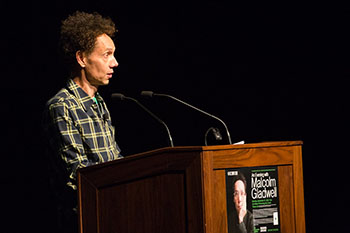Campus News
What we learn from talking to strangers
Journalist and bestselling author Malcolm Gladwell addressed a crowd of 1,500 people in Silicon Valley on Saturday. Gladwell honed in on the question of how human beings, even those who we think of as intelligent and highly trained, can be so easily deceived.


The journalist and bestselling author Malcolm Gladwell began his new book, Talking to Strangers, with a desire to make sense of the death of Sandra Bland. Bland, a 28-year-old African American woman who was pulled over in a routine traffic stop in 2015 and committed suicide in a jail cell three days later.
Gladwell, a longtime staff writer at the New Yorker magazine, shared an essential question about the Bland case before an audience of 1,500 people at the San Mateo Performing Arts Center on Saturday: “How did a simple conversation go so badly awry?”
In Talking to Strangers, Gladwell uses Bland’s tragic death as a jumping-off point in his tour of missed cues and startling miscommunications. In his hour-and-a-half-long presentation, Gladwell presented controversial material with the relaxed and disarming style he’s become known for as a public speaker and podcaster.
How did Fidel Castro fool the CIA for a generation? Why did Neville Chamberlain think he could trust Adolf Hitler? Why are campus sexual assaults on the rise?
Something is very wrong, Gladwell argues, with the tools and strategies we use to make sense of people we don’t know. And because we don’t know how to talk to strangers, we are inviting conflict and misunderstanding in ways that have a profound effect on our lives and our world.
Even though the book starts with the Bland case, Gladwell focused his talk on other topics, weaving in stories of Cuban spies, disgruntled whistleblowers, the Bernie Madoff scandal, and what it’s like to get a phone call from President Barack Obama.
Though the event was presented in partnership with The Humanities Institute at UC Santa Cruz and Bookshop Santa Cruz, it was held in Silicon Valley at Gladwell’s request. Gladwell began his talk by pointing out some of the challenges the area still faces.
“It’s exhilarating to be in Silicon Valley where the smartest minds in the world are trying to solve the world’s biggest problems, with the exception of housing and traffic,” Gladwell said, drawing a big laugh from the crowd.
Prior to the talk, he spent the day on the Peninsula, and couldn’t help poking a little fun at the area’s reputation for status and wealth.
“In Menlo Park there’s a road called Middle Avenue,” he said. “Google maps updates it to Upper Middle Avenue. And Waze just says it’s the best road.”
The humorous asides were a counterbalance to some of the more sensitive material he covered during the evening, including the role that alcohol played in the case of Brock Turner, the former Stanford University swimmer who was convicted of sexually assaulting a woman while she was unconscious. He faced up to 14 years in prison but wound up serving just three months.
The woman, Chanel Miller, stepped forward and publicly identified herself this year.
That chapter is set in Silicon Valley, and Gladwell said that when he decided to write about, it made a lot of people quite nervous.
“I think that there’s a way to do that chapter that is problematic,” said Gladwell. “I think I did it in a way that is not. But that’s a judgment you will have to make.”
Gladwell has spent his career writing about science and society, and is the author of five bestselling books, The Tipping Point, Outliers, Blink, What the Dog Saw, and David and Goliath.
“Gladwell’s books have become cultural touchstones, often changing the way we think about human behavior,” said UC Santa Cruz Chancellor Cynthia Larive, who introduced Gladwell.
Talking to Strangers is proving to be no different, she said. “It challenges us to consider how we interact with people whose assumptions, perceptions, and backgrounds are different from our own. As the leader of an institution that celebrates diversity and fosters inclusivity, there’s no more valuable discussion.”
The book looks at how the Bland case is a tragic example of a failure to communicate. It also examines the paradoxes that are at the heart of human society regarding the tendency to accept the statements of other people as givens.
Gladwell narrowed the focus of his talk to hone in on the question of how human beings, even those who we think of as intelligent and highly trained, can be so easily deceived.
“Evolution has selected us to trust,“ he said. Humans have “a default to truth”—where we tend to believe what we are told until the evidence gets so high that it can’t be ignored.
“I don’t care where you go, you’ll find that human beings are easily duped,” he said.
Part of his quest in the book is to set out to discover why people haven’t learned to be better at figuring out when others are lying to them. Shouldn’t we have adapted to spot the liars our society?
Gladwell said the opposite is true.
“The only way to build productive organization and motivate people is to believe in them.” The downside is that we will occasionally be misled, but our capacity to trust allows us to live our lives and participate in community, said Gladwell.
“The reason we’ve been fooled isn’t because we’ve done something wrong,” said Gladwell. “It’s because we’ve done something fundamentally right.”